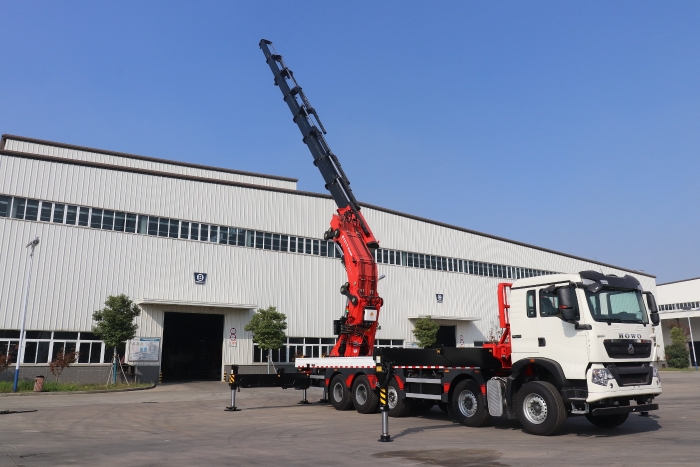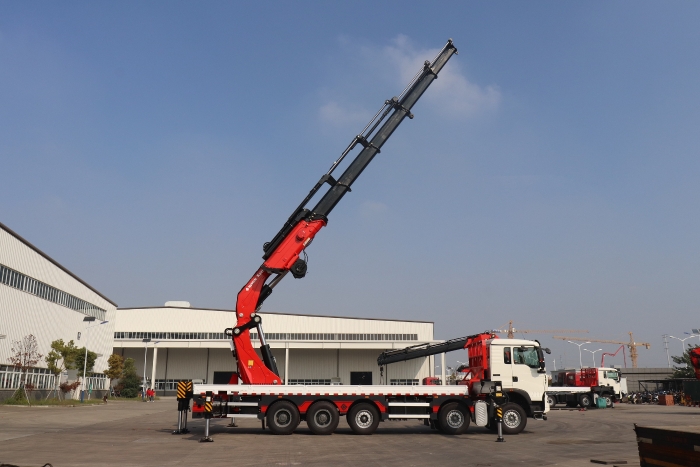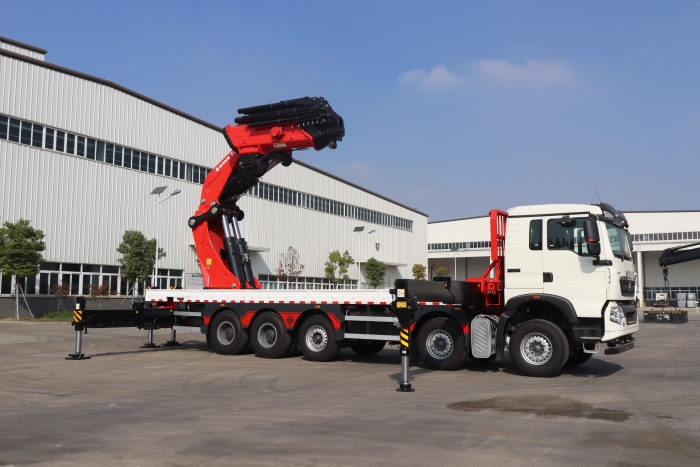- PRODUCTS
- SOLUTION
- SERVICE
- NEWS
- ABOUT US
In 2024, the cost of a crane truck ranges from $80,000 for light-duty models to over $500,000 for heavy-duty versions, depending on specifications and features.
The crane truck market in 2024 is witnessing significant fluctuations, driven by a complex interplay of supply chain dynamics and evolving industry demands. Notably, the construction and logistics sectors are major demand drivers, with an increased focus on infrastructure development and e-commerce logistics expansion. Consequently, the demand for crane trucks is on the rise, pushing manufacturers to innovate and supply a diverse range of models catering to various operational needs.
Supply Situation and Demand Trends
Currently, the market is experiencing a tight supply scenario, largely due to raw material shortages and logistic bottlenecks. Despite these challenges, manufacturers are striving to meet the growing demand, which is anticipated to surge further. Importantly, the push towards sustainable and electric vehicles is shaping market offerings, with several manufacturers unveiling eco-friendly crane truck models.

Overview of Crane Truck Types
Crane trucks come in various types, each designed for specific tasks and operational requirements.
· Light-Duty Crane Trucks: Ideal for urban projects and smaller tasks, these vehicles offer maneuverability and efficiency. They are often used in utility, landscaping, and light construction work.
· Medium-Duty Crane Trucks: These trucks strike a balance between lifting capacity and flexibility, making them suitable for a wide range of applications, from municipal projects to medium-scale construction tasks.
· Heavy-Duty Crane Trucks: With their robust construction and high lifting capacities, heavy-duty crane trucks are indispensable for large construction projects, industrial lifting, and heavy cargo handling.
The purchase cost of crane trucks varies widely, depending on the type, brand, and specifications. In 2024, prices reflect the technological advancements and increased demand for specialized equipment.
Average Purchase Prices by Type and Brand
· Light-Duty Crane Trucks: Prices range from $80,000 to $120,000, depending on the brand and features.
· Medium-Duty Crane Trucks: These vehicles are priced between $120,000 and $200,000, with the cost influenced by the crane's lifting capacity and the truck's engine performance.
· Heavy-Duty Crane Trucks: The most powerful and versatile crane trucks on the market, their prices start from $200,000 and can exceed $500,000 for top-of-the-line models.
New vs. Used Crane Trucks
The choice between purchasing a new or used crane truck often hinges on budget constraints and operational requirements. New crane trucks come with the latest technology and warranty support but at a higher initial cost. Conversely, used crane trucks offer significant savings, with prices depending on the vehicle's age, condition, and mileage.
Type | New Crane Truck Cost | Used Crane Truck Cost |
Light-Duty | $80,000 - $120,000 | $50,000 - $90,000 |
Medium-Duty | $120,000 - $200,000 | $70,000 - $150,000 |
Heavy-Duty | $200,000+ | $100,000 - $400,000 |
Moreover, assessing the total cost of ownership, including maintenance, insurance, and operational expenses, is crucial when deciding between new and used options.
Choosing Based on Budget and Needs
Ultimately, selecting the right crane truck involves balancing budget limitations with operational requirements. Prospective buyers should thoroughly assess their project needs, including lifting capacity, reach, and mobility, to determine the most cost-effective and efficient vehicle option. Additionally, consulting with industry experts and conducting market research can provide valuable insights, helping to make an informed decision.
Maintaining a crane truck in optimal working condition involves regular maintenance, periodic inspections, and timely repairs. These practices not only ensure safety but also extend the vehicle's lifespan and reduce the risk of costly downtime.
Analysis of Average Costs
· Routine Maintenance: Includes oil changes, tire rotations, and brake inspections. Costs can range from $500 to $1,000 annually, depending on the frequency and scope of the maintenance.
· Periodic Inspections: Mandatory inspections to comply with safety regulations. These inspections typically cost between $1,000 and $3,000 per year, based on the complexity and type of crane truck.
· Necessary Repairs: Costs vary widely, from minor repairs at a few hundred dollars to major overhauls which can exceed $10,000.
Cost-Saving Tips on Maintenance
· Contract Maintenance: Securing a maintenance contract with a service provider can lead to substantial savings. Such agreements often offer fixed monthly fees, reducing unexpected expenditures and providing budget predictability.
· Preventive Maintenance: Investing in regular checks and maintenance can prevent larger, more expensive issues down the line. This approach also minimizes the risk of operational disruptions.

Operating a crane truck involves several recurring expenses. Understanding these costs is crucial for effective budget management and financial planning.
Daily Operational Costs Overview
· Fuel: One of the most significant expenses, with costs depending on the truck's fuel efficiency and operational hours. Average fuel costs can range from $2,000 to $4,000 monthly.
· Insurance: Necessary for protecting against accidents and liability. Annual premiums can vary widely, from $5,000 to $15,000, based on the coverage level and vehicle type.
· Driver Salaries: Costs depend on experience, region, and hours worked, with average salaries ranging between $3,000 and $5,000 per month.
Strategies for Managing Operating Costs
· Optimizing Routes: Planning the most efficient routes can significantly reduce fuel consumption, saving costs and time.
· Fuel-Efficient Models: Investing in crane trucks with better fuel efficiency or considering alternative fuel vehicles can lower fuel costs in the long run.
By focusing on these detailed aspects of maintenance and operating costs, companies can ensure their crane truck operations are both efficient and cost-effective. Adopting strategic practices such as contract maintenance and route optimization plays a crucial role in achieving financial sustainability and operational efficiency.
Understanding the depreciation of crane trucks and their residual value at the end of use is crucial for financial planning and asset management.
Calculating Depreciation
Depreciation of crane trucks is calculated based on their initial cost, estimated useful life, and salvage value at the end of that period. Most companies use the straight-line depreciation method, which evenly spreads the cost of the truck over its useful life.
· Expected Depreciation Rates: Depending on the type of crane truck, expected annual depreciation rates can vary. Light-duty trucks might depreciate at a rate of 15-20% per year, medium-duty trucks at 10-15%, and heavy-duty trucks at 5-10%.
Importance of Residual Value
The residual value of a crane truck is the estimated value it will retain at the end of its useful life. Maximizing this value is essential for reducing total cost of ownership.
· Maximizing Residual Value: Regular maintenance, keeping comprehensive service records, and choosing models with high demand in the used market can significantly enhance a vehicle's residual value.

Choosing between buying, financing, or leasing a crane truck involves weighing various costs and benefits.
Costs and Benefits Comparison
· Buying: Offers ownership from the start, with no restrictions on modification or usage. However, it requires a significant upfront investment.
· Financing Purchase: Spreads the cost over time, usually with interest payments. Allows for ownership at the end of the payment term.
· Leasing: Lower monthly payments than financing and no long-term commitment. However, there are usually restrictions on mileage and customization.
Key Factors to Consider
· Financial Situation: Assessing your company’s cash flow and financial stability is essential before making a decision.
· Usage Requirements: Consider how long you plan to use the truck and the expected mileage, as this can influence whether leasing or buying is more cost-effective.
Calculating the TCO of a crane truck involves considering all related costs, from purchase price to maintenance, operation, and eventual sale or trade-in value.
Strategies to Reduce TCO
· Preventive Maintenance: Regularly scheduled maintenance can prevent costly repairs and extend the vehicle's life.
· Fuel Management: Investing in fuel-efficient models and optimizing routes can significantly reduce fuel costs.
· Asset Management: Properly tracking and managing the usage, maintenance, and replacement of crane trucks ensures they are utilized efficiently and sold or traded in at the optimal time.
By understanding and managing these aspects, businesses can make informed decisions that optimize the financial and operational performance of their crane truck fleet.